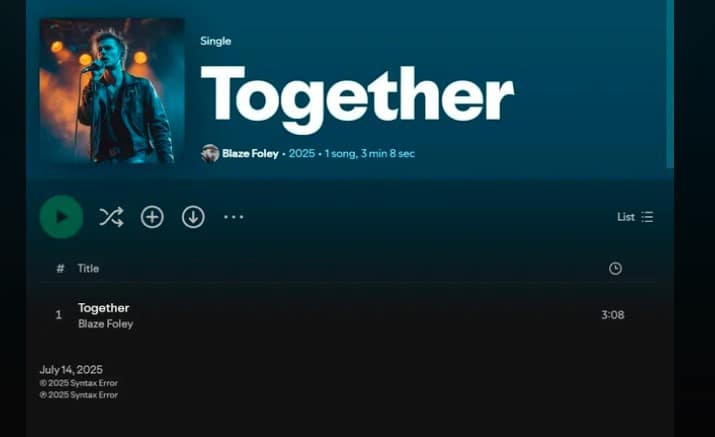Spotify has quietly listed AI-generated tracks under the official profiles of artists like Blaze Foley—without their estate’s approval or any disclaimer that they aren’t authentic.
Faked Releases on Legendary Artists’ Pages
July 21, 2025: Spotify recently added a new track titled “Together” to the official Blaze Foley artist page. Foley was a country singer-songwriter who died in 1989. The song—featuring generic vocals, piano, and electric guitar—was neither authored nor approved by Foley’s estate. What’s more, the singer’s album art shows an AI-generated image that bears no resemblance to Foley or his aesthetic.

Image Credit: Reddit
Blaze Foley’s label, Lost Art Records, and his distribution partner immediately flagged the song as inauthentic. According to the estate, any fan would recognize it as “not Blaze, not anywhere near Blaze’s style.” The distributor subsequently removed the track for violating Spotify’s deceptive content policy.
A Platform Problem – Not Just a One-Off
This incident is part of a broader trend of AI-generated music populating Spotify—sometimes under official artist profiles, giving listeners false impressions. Independent musicians like Nova Scotia’s Ian Janes have also found unauthorized AI-generated albums attributed to their names. These albums, full of generic tracks mimicking his name, were uploaded without his knowledge and later removed—but only after they appeared to have taken root.
Spotify has historically removed tens of thousands of AI tracks created by firms like Boomy that raised suspicions of bot activity or streaming manipulation. However, the platform has not implemented a system to verify consent from artists or estates before new content appears under their profile.
Industry Concerns and Legal Backlash
Major record labels—including Universal, Sony, and Warner—are suing AI music platforms like Suno and Udio for copyright infringement. They allege these tools have replicated iconic works from legendary artists without authorization, risking dilution of creative value.
Industry insiders also emphasize the need for transparency—arguing that AI-generated music should be clearly labeled. Some platforms, like Deezer, have begun tagging AI content; Spotify, so far, has not.
How Fans and Artists Are Responding
Reddit communities have raised serious concerns that Spotify may be allowing AI tracks to slip onto official pages without proper vetting or artist consent. One user described the experience as disconcerting—remaining skeptical about Spotify’s reporting mechanisms.
Music critics warn that such practices could discourage genuine creators and erode trust in streaming services. Meanwhile, advocates call for stronger policies to preserve authenticity and integrity in music distribution.
Takeaway
| Issue | Why It Matters |
|---|---|
| Consent Lapse | AI songs are appearing under official artist pages without estate approval |
| Authenticity Risk | Fans may believe fake tracks are official releases |
| Legal & Ethical Alarms | Labels are taking action; transparency remains lacking |
| Revenue Impacts | AI-style content may dilute royalties for real artists |
Will Spotify implement mandatory artist consent before AI songs can be added to profiles?
Will platform labeling become the industry standard—clearly marking synthetic tracks as such?
Can legislation catch up in protecting artist legacy in a rapidly evolving AI landscape?
Spotify’s accidental releases of AI-generated tracks attributed to deceased artists reveal systemic gaps. Without proper consent, labels, transparency, and oversight, streaming risks becoming a wild west of synthetic content masquerading as real musical legacies.
Published by HOLR Magazine


